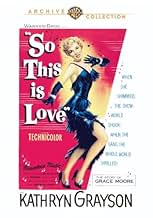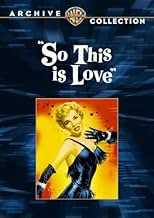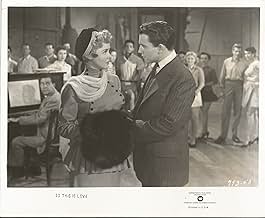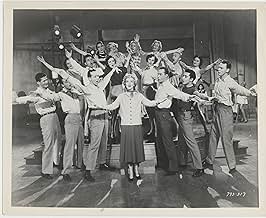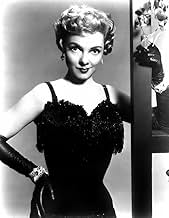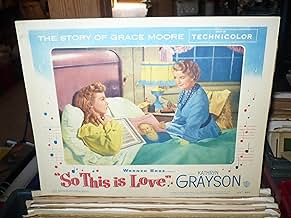Biopic über den Opernstar Grace Moore, die 1947 bei einem Flugzeugabsturz ums Leben kam.Biopic über den Opernstar Grace Moore, die 1947 bei einem Flugzeugabsturz ums Leben kam.Biopic über den Opernstar Grace Moore, die 1947 bei einem Flugzeugabsturz ums Leben kam.
John Alban
- Opera Spectator
- (Nicht genannt)
Bill Alcorn
- Backstage Performer
- (Nicht genannt)
Jerry Antes
- Chorus Boy
- (Nicht genannt)
William Bakewell
- Charles, Waiter
- (Nicht genannt)
Empfohlene Bewertungen
Before watching this biopic starring Kathryn Grayson, I'd never heard of the opera star Grace Moore. If you've never heard of her either, do an online search and learn about a woman who contributed her talents to films, Broadway, and opera. She was beautiful and had a beautiful voice, so it's no wonder Hollywood chose Kathryn Grayson to portray her!
The main problem with the film is, unfortunately, how John Monks Jr. wrote Grace's character. From her childhood through the end of the movie, she's portrayed as a snotty brat! As she pushes and pouts her way to the top, I found myself only halfway rooting for her. Kathryn is a very likable actress, so that helped me get through it. Still, Grace Moore wasn't painted out in a very favorable light. She's written to be selfish, arrogant, too big for her britches, disrespectful, and unwilling to pay her dues. I wonder why the script wasn't changed-or perhaps it had been, and Miss Moore was even more unlikable in real life!
Still, Kathryn gets to show off her beautiful voice and her distracting figure. She's joined by Walter Abel, Rosemary DeCamp, Merv Griffin, Joan Weldon, and Douglas Dick, but besides Walter-who plays her frustrated father-no one else is really given anything to do. As biopics go, this one's really only watchable because Kathryn Grayson is so cute and has such a beautiful voice. If you're looking for one that stands on its own merit, watch Love Me or Leave Me.
The main problem with the film is, unfortunately, how John Monks Jr. wrote Grace's character. From her childhood through the end of the movie, she's portrayed as a snotty brat! As she pushes and pouts her way to the top, I found myself only halfway rooting for her. Kathryn is a very likable actress, so that helped me get through it. Still, Grace Moore wasn't painted out in a very favorable light. She's written to be selfish, arrogant, too big for her britches, disrespectful, and unwilling to pay her dues. I wonder why the script wasn't changed-or perhaps it had been, and Miss Moore was even more unlikable in real life!
Still, Kathryn gets to show off her beautiful voice and her distracting figure. She's joined by Walter Abel, Rosemary DeCamp, Merv Griffin, Joan Weldon, and Douglas Dick, but besides Walter-who plays her frustrated father-no one else is really given anything to do. As biopics go, this one's really only watchable because Kathryn Grayson is so cute and has such a beautiful voice. If you're looking for one that stands on its own merit, watch Love Me or Leave Me.
Kathryn Grayson portrays singer Grace Moore in "So This is Love," a 1953 musical biography. Merv Griffin, of all people, plays one of her suitors. The film also features Douglas Dick, Jeff Donnell, Joan Weldon, Walter Abel, Ann Doran, and Rosemary DeCamp.
As pointed out in other reviews, this is a small part of Moore's story, concerning her early life and her efforts to become an opera star. The film also shows her Broadway success, but fails to show that she introduced the song "What'll I Do." And it completely leaves out her film career, which went from 1930 to 1939.
Moore was a lyric soprano and strongly tied to French repertoire, specifically Manon and Louise, as well as La Boheme; eventually she went into more spinto repertoire with Tosca. In films, she sang arias from Madama Butterfly and "Casta Diva" from Norma. All of which is to say that she and coloratura Kathryn Grayson did not share much repertoire. The music performed in the film, therefore, is more suited to Grayson's voice.
Kathryn Grayson does a lovely job as Moore. She's very pretty and her voice is in good shape as the ambitious singer Moore, and she's effective in the musical comedy numbers as well as the operatic ones. I don't know that her singing of "Mi chiamano Mimi" would have garnered her a standing ovation from a Metropolitan Opera audience, but the aria was put into the film as Mimi was Moore's Met debut. It's not really right for Grayson's voice.
Moore died in a plane crash in 1947, and I can't imagine a biopic today leaving that out. This film concentrates on music and the driving ambition of a young girl determined to make it on the opera stage. On that basis, it's entertaining.
As pointed out in other reviews, this is a small part of Moore's story, concerning her early life and her efforts to become an opera star. The film also shows her Broadway success, but fails to show that she introduced the song "What'll I Do." And it completely leaves out her film career, which went from 1930 to 1939.
Moore was a lyric soprano and strongly tied to French repertoire, specifically Manon and Louise, as well as La Boheme; eventually she went into more spinto repertoire with Tosca. In films, she sang arias from Madama Butterfly and "Casta Diva" from Norma. All of which is to say that she and coloratura Kathryn Grayson did not share much repertoire. The music performed in the film, therefore, is more suited to Grayson's voice.
Kathryn Grayson does a lovely job as Moore. She's very pretty and her voice is in good shape as the ambitious singer Moore, and she's effective in the musical comedy numbers as well as the operatic ones. I don't know that her singing of "Mi chiamano Mimi" would have garnered her a standing ovation from a Metropolitan Opera audience, but the aria was put into the film as Mimi was Moore's Met debut. It's not really right for Grayson's voice.
Moore died in a plane crash in 1947, and I can't imagine a biopic today leaving that out. This film concentrates on music and the driving ambition of a young girl determined to make it on the opera stage. On that basis, it's entertaining.
MGM scored a big and rather unexpected hit in 1951 with *The Great Caruso*, their very fictionalized bi op of the great Neapolitan tenor. The success was the result of several features, such as a good mix of recognizable operatic numbers and well-known Neapolitan songs. But the real winning card was Mario Lanza as Caruso. Himself the product of the poor Italian neighborhoods of South Philly, with a build like a stevedore that made him look like "a real guy" to Americans of all classes, Lanza was perfect for making a larger-than-life individual come across on screen bursting with life.
Warner Brothers could therefore be forgiven for trying to do the same thing with the American soprano Grace Moore. Moore had been a success on Broadway for a few years, then had a good if not stellar career at the Met. But it was with movies like *One Night of Love* (1934), *When You're in Love* (1937), and *I'll Take Romance* (1937), along with a lot of appearances on the radio, that Moore entered the general popular consciousness, in part because she was a good singer, in part because she was a fearless, vivacious lady in an era when most opera stars, and even many female movie stars, were still intent on being seen as "ladies." Just as Caruso was famous for (being accused of) pinching a lady in the monkey house at the zoo, Moore, to some of the same extent, crossed the line from the world of classical music to the world of Joe and Jane Smith.
It would therefore have made sense to focus on this aspect of Moore's life and career in a movie about her that was being marketed to a general audience.
For whatever reason, Warner Brothers did not do this.
Instead, this movie focuses on Moore's career up until her arrival at the Met, and does not make any effort to suggest that she was "a wild and crazy lady." (You wouldn't hire Kathryn Grayson for that, anyway.) We get a paint-by-the-numbers story of an almost uninterrupted rise to success, and it isn't interesting.
Nor, as others point out, do we get much of the popular music that was associated with Moore. Her one performance of Ciriciribin gets interrupted before the last high note, which is what Moore had been famous for. (It's even referenced in *Funny Woman*.)
There's also another problem with this movie: it is the story of a woman who put career before love and family, but then doesn't do much with that. For American audiences in 1953, that was still a fairly radical theme, and should have been developed a lot more carefully.
There are all sorts of other, lesser problems. It is very antiseptic. The movie starts off when Moore is a child in Tennessee, but NO ONE speaks with even a hint of a Southern accent. Later, Moore sings with the great Irish tenor John McCormack, but he neither speaks nor sings with an Irish accent.
In general, the film looks cheaply made, the way Warner Brothers' 1952 April in Paris looks cheap after MGM's lavish 1951 An American in Paris. (April in Paris is still a lot better movie than this, though, thanks in large part to better music and Doris Day.)
If you want to learn about Grace Moore, read her entertaining autobiography *You're Only Human Once*. (I think there's also a biography, but I can't remember the title and couldn't find it on amazon.com) This movie makes her seem boring, and that is one adjective that no one who remembered her from when she was popular would associate with her.
Warner Brothers could therefore be forgiven for trying to do the same thing with the American soprano Grace Moore. Moore had been a success on Broadway for a few years, then had a good if not stellar career at the Met. But it was with movies like *One Night of Love* (1934), *When You're in Love* (1937), and *I'll Take Romance* (1937), along with a lot of appearances on the radio, that Moore entered the general popular consciousness, in part because she was a good singer, in part because she was a fearless, vivacious lady in an era when most opera stars, and even many female movie stars, were still intent on being seen as "ladies." Just as Caruso was famous for (being accused of) pinching a lady in the monkey house at the zoo, Moore, to some of the same extent, crossed the line from the world of classical music to the world of Joe and Jane Smith.
It would therefore have made sense to focus on this aspect of Moore's life and career in a movie about her that was being marketed to a general audience.
For whatever reason, Warner Brothers did not do this.
Instead, this movie focuses on Moore's career up until her arrival at the Met, and does not make any effort to suggest that she was "a wild and crazy lady." (You wouldn't hire Kathryn Grayson for that, anyway.) We get a paint-by-the-numbers story of an almost uninterrupted rise to success, and it isn't interesting.
Nor, as others point out, do we get much of the popular music that was associated with Moore. Her one performance of Ciriciribin gets interrupted before the last high note, which is what Moore had been famous for. (It's even referenced in *Funny Woman*.)
There's also another problem with this movie: it is the story of a woman who put career before love and family, but then doesn't do much with that. For American audiences in 1953, that was still a fairly radical theme, and should have been developed a lot more carefully.
There are all sorts of other, lesser problems. It is very antiseptic. The movie starts off when Moore is a child in Tennessee, but NO ONE speaks with even a hint of a Southern accent. Later, Moore sings with the great Irish tenor John McCormack, but he neither speaks nor sings with an Irish accent.
In general, the film looks cheaply made, the way Warner Brothers' 1952 April in Paris looks cheap after MGM's lavish 1951 An American in Paris. (April in Paris is still a lot better movie than this, though, thanks in large part to better music and Doris Day.)
If you want to learn about Grace Moore, read her entertaining autobiography *You're Only Human Once*. (I think there's also a biography, but I can't remember the title and couldn't find it on amazon.com) This movie makes her seem boring, and that is one adjective that no one who remembered her from when she was popular would associate with her.
SO THIS IS LOVE is said to be based on a biography of singer Grace Moore, but it only touches on her early life and determination to become an opera singer, up until her New York City debut at the Metropolitan Opera House in "La Boheme." Before it reaches that point, it gives KATHRYN GRAYSON a chance to sing a variety of songs in coloratura style, but since the story does not cover Miss Moore's Hollywood career at all, many of her most well-known songs had to be omitted. Instead, we get a sprinkling of a few opera numbers and many other pop standards, all of them suitable for Grayson's voice. She's in fine form vocally and delivers all of the songs with her customary charm and grace.
MERV GRIFFIN, before his celebrity and TV fame, makes his second appearance in a movie as one of Miss Moore's admirers and gets to warble "I Kiss Your Hand Madame" while doing a nice job on the vocals. WALTER ABEL and ANN DORAN play Grayson's parents, not at all thrilled that she wants to leave her small town life for a fling at stardom in the big city.
Grayson has a role that is tailor-made for her own background as a singer. DOUGLAS DICK is rather colorless as another disappointed suitor who can't compete with her operatic ambitions, but FORTUNIO BONANOVA is excellent as a sympathetic voice coach who makes sure that she takes proper care of her throat condition before returning to him for his coaching.
The story simply ends with her first appearance at the Met as Mimi in "La Boheme." Opera fans should enjoy this tribute to Miss Moore, and fans of Miss Grayson should appreciate the care taken to photograph her in beautiful close-ups while she takes aim at arias by Gounod and Puccini.
MERV GRIFFIN, before his celebrity and TV fame, makes his second appearance in a movie as one of Miss Moore's admirers and gets to warble "I Kiss Your Hand Madame" while doing a nice job on the vocals. WALTER ABEL and ANN DORAN play Grayson's parents, not at all thrilled that she wants to leave her small town life for a fling at stardom in the big city.
Grayson has a role that is tailor-made for her own background as a singer. DOUGLAS DICK is rather colorless as another disappointed suitor who can't compete with her operatic ambitions, but FORTUNIO BONANOVA is excellent as a sympathetic voice coach who makes sure that she takes proper care of her throat condition before returning to him for his coaching.
The story simply ends with her first appearance at the Met as Mimi in "La Boheme." Opera fans should enjoy this tribute to Miss Moore, and fans of Miss Grayson should appreciate the care taken to photograph her in beautiful close-ups while she takes aim at arias by Gounod and Puccini.
This seems to be fairly accurate as a biopic. certainly, the sequence where Grace Moore's vocal trauma was dealt with appeared to follow the events and treatment described in You're Only Human Once, Moore's autobiography.
1953 was a year in which two American singers starred in filmed tributes to stars of earlier times: Patrice Munsel played the title role in the British production of Melba, and Kathryn Grayson made a convincing and entertaining Grace Moore for Warners.
So This Is Love is a film that many people may find enjoyable, and seems to have been a worthy attempt by both the star and the studio to pay their sincere respects to Grace Moore, herself an outstanding figure in stage and film work. Hopefully it may soon be available on DVD or whatever the new formats may be.
1953 was a year in which two American singers starred in filmed tributes to stars of earlier times: Patrice Munsel played the title role in the British production of Melba, and Kathryn Grayson made a convincing and entertaining Grace Moore for Warners.
So This Is Love is a film that many people may find enjoyable, and seems to have been a worthy attempt by both the star and the studio to pay their sincere respects to Grace Moore, herself an outstanding figure in stage and film work. Hopefully it may soon be available on DVD or whatever the new formats may be.
Wusstest du schon
- WissenswertesKathryn Grant's film debut.
- PatzerGrace's hometown is misspelled "Jellicoe" instead of "Jellico." While this mistake has been made over many decades by many others, you'd think someone in a biopic production would at least make a phone call or check a map to get it right.
Top-Auswahl
Melde dich zum Bewerten an und greife auf die Watchlist für personalisierte Empfehlungen zu.
Details
- Erscheinungsdatum
- Herkunftsland
- Sprache
- Auch bekannt als
- Cumbres doradas
- Drehorte
- Produktionsfirma
- Weitere beteiligte Unternehmen bei IMDbPro anzeigen
- Laufzeit
- 1 Std. 41 Min.(101 min)
- Seitenverhältnis
- 1.37 : 1
Zu dieser Seite beitragen
Bearbeitung vorschlagen oder fehlenden Inhalt hinzufügen

